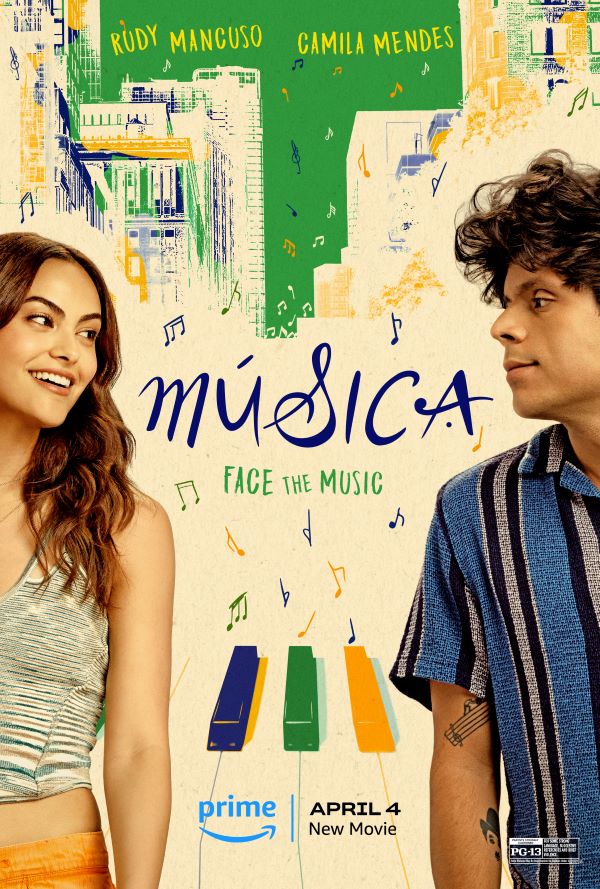In the romantic comedy “Música,” Rudy is a young man who experiences the world through sound. In his ears, everyday noises become symphonies of life, a daily rhythm that distracts him from class and his girlfriend Haley (Francesca Reale). His mother Maria (Maria Mancuso) suggests Rudy date someone from their Brazilian community in Newark, New Jersey. After rebelling against these demands, he meets a fellow Brazilian American named Isabella (Camila Mendes) at a local fish market, and with that, Rudy starts to hear a new tune, one that’s music to his ears.
“Música” delivers what it promises: a love story, musical numbers, and a celebration of Brazilian culture, starting with the movie’s color-coded poster that reflects the country’s green, yellow and white flag. Through Rudy, a character based on the film’s writer and director Rudy Mancuso, we get a sense of his experience with synesthesia, a condition where sensory stimulus leads to a second sensory stimulus, i.e. a person can taste colors or hear something that triggers a visual response. Rudy experiences the latter, where everyday sounds of traffic, airplanes, kids playing in a park, people talking, and going about their lives are loud enough to disrupt his thoughts, and in the film, his experience is illustrated by musical numbers that use everyday objects as instruments in the style of the recently departed off-Broadway show “Stomp.” It’s a little “All That Jazz” in the way that Mancuso uses song and dance to illustrate his struggles to connect with others and live up to their expectations. Mancuso, who composed the music behind “Música,” uses puppetry, animation and innovative production design to further his creative vision. Some songs and sequences don’t always hit the right notes—the songs the busker sings at the train station are among the movie’s weakest points. But then there are show-stopping moments—like a long take of Rudy running around town to keep the three women in his life happy using different settings and props—that are truly impressive, elevating this romantic comedy a cut above the straightforward “boy-meets-girl” setups that treat visual style like an afterthought.
Despite a few unfinished edges and missteps, there’s much to savor in Mancuso’s feature debut. In addition to the film’s romantic plot, Mancuso, who co-wrote the film with Dan Lagana, explores his own connection to Brazilian culture. He easily slips between speaking English and Portuguese on several occasions; even on a date, he saves room for his mother’s home cooked feijoada; bossa nova beats and samba dance moves are woven seamlessly into the film’s musical fabric, and in one hilarious sequence at a restaurant, he gulps several rounds of cachaça, perhaps the most in any American movie. Mancuso also addresses some of the thornier sides to sticking so close to home, like how his mother Maria (played by Mancuso’s real mother) insists he settle down with another Brazilian girl. He also faces Haley’s parents’ ignorance about his country when they assume he speaks Spanish like their Central American housekeeper, and Rudy has to consider whether to correct them or let it slide to keep the peace. It’s likely that more than a few second and third generation children of immigrants will find something to relate to in Mancuso’s film, but at the same time, it feels so unique because of how rarely we see the Brazilian-American experience on screen.
That celebratory spirit extends to Mancuso’s relationship with scene-stealing co-star, his mom. Their dynamic in the film is even livelier than Rudy’s dates with Isabella, which feel more like a glowing idealized version of what could be, and Haley, the girlfriend whose goals and plans for the future no longer align with what our main character wants. He wonders about leaving his mother after college and is clearly very close with her despite her dismissal of his artistic pursuits and disapproval of his dating choices, which may sound like familiar feedback from some of our own parents. Over the credits, Mancuso’s childhood photos unfold alongside the names and titles of the cast and crew, making “Música” feel as much of a love letter to her as it is to the music that inspires him and the culture that shaped him. Right to the end, “Música” becomes more than just another bland romcom. It’s about finding love when living with a disability, it’s about finding music wherever it may be, and it’s about our connection to our culture and our family.
On Prime Video now.




















